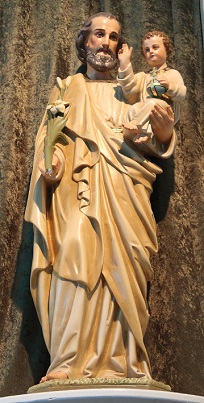Patronage of St. Joseph. -Third Sunday after Easter.
by VP
Posted on Sunday April 21, 2024 at 01:00AM in Tradition
St. Joseph, Mother of Mercy, Washington, NC
"The Feast of the Patronage of St. Joseph, which a decree of the Congregation of Rites has fixed on the third Sunday after Easter, originated among the Carmelites in 1680. A general chapter of the Carmelites had already, in 1621, solemnly recognized St. Joseph as patron and father of all the order. Some churches soon adopted the Feast of the Patronage. At present, in virtue of a decree of the 10th September, it extends to all Catholicity. Among the Redemptorists and Passionists, in the Society of Mary and the Society of Jesus, it is celebrated with its own octave and office, with the double rite of first class." Devotion to Saint Joseph by Fr. Giuseppe Antonio Patrignani 1897
PRAYER
O glorious St. Joseph, to whom God has confided, as to a most loving and powerful patron, His universal Church, protect, I beseech thee, in the first place, the Sovereign Pontiff, who is the Vicar of thy Son on earth; protect also all the prelates of Holy Church, and extend thy patronage over all the faithful, that both the pastors and their sheep may enjoy eternal happiness together in heaven. Amen.
In proclaiming St. Joseph Patron of the Universal Church, the Sovereign Pontiffs seem to have wished to implicitly acknowledge the hidden but real influence which the holy Patriarch has exercised and still does exercise not only over the Church Militant, but also over the souls that are suffering in purgatory. It may be assumed that St. Joseph, through his powerful intercession, hastens the liberation of those souls. Furthermore, the patronage of St. Joseph may be said to extend in some way over the saints who reign with Christ in heaven. For there is not one who is not in some manner indebted to the holy Patriarch for the happy attainment of his eternal salvation, since to his wonderful guardianship was due the preservation of the Redeemer's life. The angels also must in some way acknowledge their dependence on the most holy spouse of Mary, since they are inferior to him in glory, and thus form, as it were, a crown for him in heaven.
But it is especially in regard to ourselves who are still paying the penalty of the transgression of our first parents in this land of exile that St. Joseph exercises with special efficacy his all-powerful patronage. The more perfect a saint is in charity, the more eager is he in praying for us poor wayfarers here below, and the more efficacious are his prayers as he stands nearer the throne of God.
St. Joseph, therefore, whose charity is surpassed by that of no other saint, his holy spouse alone being excepted, prays for us sinners oftener and with greater efficacy than does any other saint. He even anticipates our requests, interpreting our desires and presenting our needs before the Throne of divine mercy. Wherefore, to him may be applied these words spoken of Jeremias: "This is a lover of his brethren and of the people of Israel: this is he that prayeth much for the people and for all the Holy City."
As the patronage of St. Joseph extends over the entire Church, there is therefore no earthly necessity for which the holy Patriarch cannot efficaciously provide. No man on this earth can assist us in all our needs, since human mercy and power are necessarily limited. But so unbounded is the compassion which St. Joseph feels toward us, so great is his power in heaven, that his patronage is restricted neither by time nor place, and there is no manner of grace which he cannot obtain for us. His fatherly care extends to all our needs and embraces even our future wants. It seems, therefore, as if Jesus Christ Himself would say to us what Pharao once said to the Egyptians: "Go to Joseph; and do all that he shall say to you."
St. Joseph's provident care extends, then, to all the faithful who have recourse to him with confidence. He asks of God
for them whatever spiritual graces they may need to lead holy lives.
Nor does he forget to obtain for them the temporal graces necessary for
their eternal salvation. In fact, as the ancient Joseph, once in charge of the granaries of Pharao, procured food for the people of Egypt during the time of famine, so St. Joseph's solicitous care embraces the domestic needs of the faithful who trust in him and call on his help with filial confidence." Go to Joseph, Our Unfailing Protector: Considerations on the Life and Virtue ...Very Rev. By Alexis Henri Marie Lepicier, O.S.M. 1923
